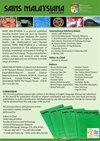Processing of Herbal-Based Natural Products and Functional Foods: A Review
IF 0.8
4区 综合性期刊
Q3 MULTIDISCIPLINARY SCIENCES
引用次数: 0
Abstract
The growing worldwide emphasis on health and wellness, leading to increased demand for natural plant-based ingredients in foods. This shift is driven by concerns over synthetic additives in processed foods, giving rise to the popularity of plant-based functional foods. The global functional food market is projected to reach $275.77 billion by 2025, with a surge in demand for plant-based immune-boosting products due to the COVID-19 pandemic. Malaysian herbs, with their rich history of culinary and traditional use, are gaining attention as functional ingredients. However, their incorporation into food products requires more advanced processing methods and research. Malaysia's biodiversity offers untapped economic potential, and the country's herbal industry is experiencing growth in exports and research investments. Herbal ingredients, containing active phytochemicals, are sometimes referred to as botanical substances and can be incorporated into formulations for functional foods. The review classifies herbal-based food products as herbal medicine, botanical food, or food-drug interphase (FDI). Herbal processing methods are crucial for ensuring the functionality of herbal-based products. Primary processing steps include sorting, cutting, drying, and grinding. Specific processing functions involve retaining active compound contents, enhancing effectiveness, reducing toxicity or side effects, and changing active compound properties or functions. The review also discusses the application of herb combinations in functional foods, highlighting the need for careful consideration of interactions between herbs and other components. Approaches to functional food development in Malaysia include refining existing products, creating new formulations, and integrating novel processing technologies. Future research directions include enhancing bioavailability and functionality of active compounds, exploring nanosystem technology, and incorporating nutrigenomics for disease prevention through dietary interventions.草本天然产品和功能食品的加工:综述
全世界对健康和保健的日益重视,导致对食品中天然植物成分的需求增加。人们对加工食品中合成添加剂的担忧推动了这一转变,植物性功能食品因此大受欢迎。预计到 2025 年,全球功能食品市场将达到 2757.7 亿美元,由于 COVID-19 的流行,对植物性免疫增强产品的需求将激增。马来西亚草药具有丰富的烹饪和传统使用历史,作为功能性配料正受到越来越多的关注。然而,将它们融入食品中需要更先进的加工方法和研究。马来西亚的生物多样性提供了尚未开发的经济潜力,该国的草药产业正在经历出口和研究投资的增长。含有活性植物化学成分的草药成分有时被称为植物物质,可被纳入功能性食品的配方中。本综述将以草药为基础的食品分为草药、植物食品或食品-药物相(FDI)。草药加工方法对确保草药产品的功能至关重要。主要加工步骤包括分类、切割、干燥和研磨。具体的加工功能包括保留活性化合物含量、提高功效、降低毒性或副作用,以及改变活性化合物的特性或功能。综述还讨论了草药组合在功能食品中的应用,强调需要仔细考虑草药与其他成分之间的相互作用。马来西亚开发功能食品的方法包括改进现有产品、创造新配方和整合新型加工技术。未来的研究方向包括提高活性化合物的生物利用率和功能性,探索纳米系统技术,以及通过膳食干预将营养基因组学用于疾病预防。
本文章由计算机程序翻译,如有差异,请以英文原文为准。
求助全文
约1分钟内获得全文
求助全文
来源期刊

Sains Malaysiana
MULTIDISCIPLINARY SCIENCES-
CiteScore
1.60
自引率
12.50%
发文量
196
审稿时长
3-6 weeks
期刊介绍:
Sains Malaysiana is a refereed journal committed to the advancement of scholarly knowledge and research findings of the several branches of science and technology. It contains articles on Earth Sciences, Health Sciences, Life Sciences, Mathematical Sciences and Physical Sciences. The journal publishes articles, reviews, and research notes whose content and approach are of interest to a wide range of scholars. Sains Malaysiana is published by the UKM Press an its autonomous Editorial Board are drawn from the Faculty of Science and Technology, Universiti Kebangsaan Malaysia. In addition, distinguished scholars from local and foreign universities are appointed to serve as advisory board members and referees.
 求助内容:
求助内容: 应助结果提醒方式:
应助结果提醒方式:


